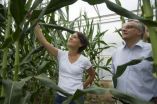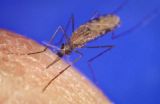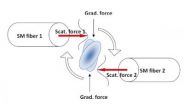The conference kicked off with a plenary session on the latest advances in sequencing technologies and their application in disease research, including opening remarks from Professor Huanming Yang, Chairman of BGI, Dr. Jun Wang, Executive Director of BGI, and Dr. Ray Yip, Director of China Programs at the Bill & Melinda Gates Foundation. Their featured presentations captured the primary focus of the conference: propelling Omics-related research towards practical applications that improve human health and global food production.
From an overview of the past six meetings, Professor Yang expressed his confidence in the success of ICG-7. He introduced the global benefit of collaborative genomics research and the latest updates on ongoing collaborations and research +projects, saying, "Science is needed by all, done by all, and shared by all. We are all in the same boat, headed in the same direction, applying next-gen sequencing (NGS) technologies and bioinformatics with the goal of promoting global genomic research in a spirit of collaboration."
In the following presentation, Dr. Jun Wang gave an inspiring talk entitled "Life is a Game of Evolution". Through summarizing BGI's diverse research activities and achievements over the past years, he pointed out the "Omics" way of studying life plays an important role in boosting human health and agricultural development. He said, "Due to NGS technologies, advancements in genomics have been moving rapidly forward. BGI focuses on translating Omics-related research into molecular breeding and disease-association studies with the aim to benefit agriculture and human health."
With a view on moving from genomics to application, Dr. Ray Yip's presentation focused on the potential of genomics in reducing poverty and improving health outcomes in the developing world. He stressed the development history of the Bill & Melinda Gates Foundation, and the significance of global cooperation. He said, "Only collaboration can better save millions of children, and boost the further development of agriculture." This September, BGI and the Bill & Melinda Gates Foundation reached a strategic collaborative agreement to bring the benefit of genomics research to global society.
Advanced technologies for Omics research
Genome sequencing technologies have revolutionized the life sciences, and are now poised to change the way we carry out healthcare and agriculture. At the conference, several speakers introduced the latest technologies for omics research, including long fragment read (LFR) technology, Semiconductor Sequencing, and the new Illumina HiSeq 2500 system, among others.
Dr. Radoje Drmanac, Chief Scientific Officer (CSO) at Complete Genomics, Inc. (CGI), introduced their WGS (whole genome sequencing) service, combining massively parallel Nanoarray-based whole human genome sequencing and an innovation business model. In his presentation, he described the importance of the "genome" in five words: ultimate, powerful, predictive, accessible, and modifiable. Dr. Drmanac said that they have recently developed an efficient DNA barcoding method termed long fragment read technology that will make clinical quality WGS possible for researchers to comprehensively investigate the mechanisms underlying human diseases.
Since its commercial launch two years ago, semiconductor sequencing technology has gained widespread adoption. Dr. Dale Patterson from Life Technologies presented their new Ion Proton System at the conference. He said this new system could offer "massive flexibility" to match the user's application. Billions of dollars have been invested in semiconductor technology, and it has proven to be a very scalable system that will enable the very first $1000 human genome in 2013.
Dr. Todd Dickinson from BioNano Genomics introduced their single molecule genome analysis system (Irys) based on nanochannel array technology that linearizes extremely long DNA molecules for high quality data imaging and yield. In the conference, Illumina introduced its HiSeq 2500, a next-generation sequencing system that will enable researchers and clinicians to sequence an entire genome in approximately 24 hours. The HiSeq 2500 leverages the continued technology advancements from both the HiSeq 2000 and MiSeq™ platforms.
Dr. Emily Leproust from Agilent Technologies Inc. discussed the future of genomics-Multi-omics, and provided an overview of the various Omic tools as well as Agilent's informatics approaches surrounding the integration of multi-omics datasets and their joint pathway-level representation to provide improved biological context in the study of human diseases.
Applied Genomics in Human Health
The advent of powerful NGS technology has enabled an unprecedented ability to better understand the pathogenic mechanism of various human diseases. In the conference, there were more than 30 presentations focusing on human disease research, including complex diseases, rare diseases, clinical genetics, personal genomics, among others.
Dr. Gane Ka-Shu Wong from University of Alberta delivered a presentation themed "Non-random Integrations of a Human Betaretrovirus". In his report, he referred that the underlying reason for the non-random integration of betaretrovirus remains a mystery, but his team's study demonstrated that there are indeed betaretroviruses that are capable of infecting humans.
Dr. Lars Bolund from Aarhus University demonstrated the importance of digitalized Pigs: genetically designed Pigs for medical research. Dr. Bolund presented examples of genetically designed model pigs prone to develop disease processes such as atherosclerosis, metabolic dysregulation, inflammation, neurodegeneration, and cancer. He emphasized the importance of genetically designed Pigs in the studies of Chronic Disease Processes and Regenerative Medicine
The identification of the genetic cause of a disease is of great importance for patient management and family counseling, and serves as a starting point for therapeutic interventions. Dr. Jianguo Zhang from BGI gave a report focusing on the application of NGS in rare disease research. He stressed that many rare disease studies demonstrate that NGS is extremely efficient and cost-effective approach for the identification of a rare variants or diagnosis for patients with genetic disorders.
The rapid development of NGS is revolutionizing the way doctors are now treating their patients, noticeably in the fields of oncology, clinical testing and pharmacogenetics. In the future, DNA sequencers might be as common as a stethoscope in a doctor's office, but for now the necessary infrastructure and bioinformatics for such point-of-care sequencing remain a long way off.
Dr. Tze Kin LAU, a specialist in Obstetrics and Gynaecology, mentioned in his presentation that there are still lots of challenges for sequencing technologies to be widely used into the fields of obstetrics and prenatal diagnosis, such as potential ethical challenges. He said that there was an urgent need for closer collaborations between scientists and obstetricians, so that new technologies could be implemented without delay yet under tight regulations, with the ultimate aim to meet the needs of parents-to-be.
Dr. Lennart Hammarström from Karolinska Institutet Huddinge has been working on various aspects of clinical immunology for the past 30 years, concentrating on the genetics of immunodeficiency diseases/autoimmune diseases and different forms of immunotherapy for these patient categories. In the conference, he shared his latest studies on Primary immunodeficiency disorders (PIDs) with the attendees. He said, "PIDs are rare diseases affecting the immune system. Together with our colleagues at BGI, we have recently been able to identify patients carrying novel mutations."
Other highlights of the topic include the report from Dr. Kael F. Fischer from Department of Pathology, University of Utah, stressing the importance of virology in clinic research and the report from Dr. Vince Gao from BGI, introducing a mass spectromety-sequencing strategy for clinical transomics applications, which can allow early test and treatment of disease affected infants.
Applied Genomics in Agriculture
The benefits of animal and plant genomics research for the agricultural industry are enormous, such as their significant role in vaccine & therapeutics development, breeding and selection for meat quality, milk production and pest resistance. At the conference, there was much heated discussion on the latest genomic studies of important crops and livestock.
Dr. Martien Groenen from Wageningen University addressed the topic "Genome Evolution in the Pig and Related Suids", indicating genomes of closely related (sub)species are shaped by a myriad of past evolutionary events. Dr. Wen Wang from Kunming Institute of Zoology, Chinese Academy of Sciences, presented the reference genome of the domestic goat, the first vertebrate genome to be assembled using the latest optical mapping technology. Dr. Jianquan Liu from Lanzhou University, presented "Yak Domestication and Adaptation Evidenced by Genetic Data", and pointed out that their findings may have important implications for understanding adaptation to high altitude in other animal species and for hypoxia-related diseases in humans.
In the session of Plant genomes, keynote speakers included Dr. Christian Bachem from Wageningen University, Dr. Hon-Ming Lam from The Chinese University of Hong Kong, Dr. Kermit Ritland from University of British Columbia, Dr. Michael Udvardi from Samuel Roberts Noble Foundation, Dr. Igor Yakovlev from Norwegian Forest and Landscape Institute, among others. They delivered reports on the studies of potato, soybean, conifer, and other model plants, demonstrating the power of whole genome sequencing in expediting genetic studies of crops.
Integrating Literature and Data
In a special session organized by Dr. Laurie Goodman from BGI's new integrated journal and database, GigaScience, the latest efforts in integrating these increasing enormous volumes of biological data into the scientific literature were presented by speakers representing publishers, databases and biological research. Representing co-publisher of GigaScience, BioMed Central, Iain Hrynaszkiewicz presented on best practices, data licensing, and BioMed Central's current and future approaches to Data-Literature integration, and Dr. Rebecca Lawrence from F1000 Research presented a related talk covering data publishing and review. Dr. Ewan Birney, joint Associate Director of the EBI presented his experiences as lead analysis coordinator for the ENCODE project, and the novel ways the over 400 authors involved worked together and coordinated publication of over 30 publications across a number of journals, and produced an iPad app that allows readers to read topics of interested as combined threads. ENCODE has pushed the bar on how published research can be made more reproducible, with all of the 5TB of supporting data from over 3000 experiments being publicly available, and each figure in the main publication having a specific code bundle independently tested by another researcher in a publicly available Virtual Machine hosted in the Cloud. Showcasing a similar approach, GigaScience's Dr. Scott Edmunds closed the session presenting moves to publish methods and tools featured in their papers integrated into a Galaxy-based data platform being build at BGI and the Chinese University of Hong Kong.
Bio-cloud and Big Data Management
With the cost of DNA sequencing steadily plummeting in price, the amount of data generated with NGS technologies continues to grow at an unprecedented pace. In the age of "Big Data", the handling, storing and sharing have become significant research bottlenecks. However, leveraging cloud computing technology, allows the flood of data and bioinformatics tools to be made available to anyone anywhere and through many different devices.
In the conference, researchers shared their latest advances in bioinformatics, big data management, and others. Presented at the conference include new bioinformatics analysis pipelines and software, including SOAP3-dp, a fast accurate and sensitive GPU-based short read aligner, as well as an updated version of EasyGenomics, BGI's cloud-based bioinformatics solution. Dr. Myles Axton from Nature Genetics presented "Formatting, Timing and Attribution For Research Data", and stated that they encouraged the use of explicit data management plans written at the grant stage that can evolve from an explanation of the project and the resources it will generate.
Dr. Xing Xu from BGI stated in his report, "EasyGenomics is a robust cloud-based bioinformatics solution for NGS data analysis, which is engineered with BGI's state-of-the-art technologies and platforms. Through this excellent platform, researchers have the means to access these informatics resources at their fingertips".
Dr. Shaoliang Peng from National University of Defense Technology, presented an overview of the TianHe supercomputer (until last year the worlds #1) and its bio-applications such as oil exploration, weather forecast, bio-medical research. He said, "Now we are doing some projects and research works on bioinformatics with BGI, such as large genomes assembly and GWAS".
The ICG-7 and Bio-IT APAC 2012 conference provided an excellent platform for researchers to exchange their knowledge and insights on sequencing and bioinformatics technologies. The advances of technologies and infrastructures will allow more contributions to improve human health and diseases, agriculture and bio-energy.
Furthermore, BGI announced the plan for organizing series ICG conferences in 2013, including ICG-Europe, ICG-Americas and ICG-8, with the aim to promote more international collaborations and accelerate innovations and applications of genomics research under a global effort. INFORMATION:
About BGI
BGI was founded in 1999 with the mission of being a premier scientific partner to the global research community. The goal of BGI is to make leading-edge genomic science highly accessible through its investment in infrastructure that leverages the best available technology, economies of scale, and expert bioinformatics resources. BGI, which includes both private non-profit genomic research institutes and sequencing application commercial units, and its affiliates, BGI Americas, headquartered in Cambridge, MA, and BGI Europe, headquartered in Copenhagen, Denmark, have established partnerships and collaborations with leading academic and government research institutions as well as global biotechnology and pharmaceutical companies, supporting a variety of disease, agricultural, environmental, and related applications.
BGI has established a proven track record of excellence, delivering results with high efficiency and accuracy for innovative, high-profile research which has generated over 250 publications in top-tier journals such as Nature and Science. These accomplishments include sequencing one percent of the human genome for the International Human Genome Project, contributing 10 percent to the International Human HapMap Project, carrying out research to combat SARS and the German deadly E. coli outbreak, playing a key role in the Sino-British Chicken Genome Project, and completing the sequence of the rice genome, the silkworm genome, the first Asian diploid genome, the potato genome, the human Gut metagenome, and a significant proportion of the genomes for 1,000 genomes. For more information about BGI please visit www.genomics.cn.
Contact information:
Bicheng Yang, Ph.D.
Public Communication Officer
BGI
+86-755-82639701
yangbicheng@genomics.cn
www.genomics.cn




